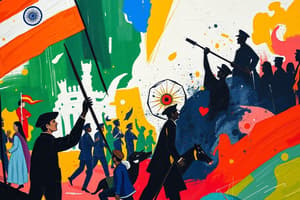Podcast
Questions and Answers
Why did the Indian National Congress agree to the partition of the country in 1947?
Why did the Indian National Congress agree to the partition of the country in 1947?
- The principal of two-Nation theory was then acceptable to them
- India would have otherwise lost the opportunity to attain freedom (correct)
- It was imposed by the British Government and the Congress was helpless in this regard
- They wanted to avoid large-scale communal riots
At the time of India's Independence, what was Mahatma Gandhi's role in the Indian National Congress?
At the time of India's Independence, what was Mahatma Gandhi's role in the Indian National Congress?
- Not a member of the Congress
- A member of Congress Working Committee (correct)
- The President of the Congress
- The General Secretary of the Congress
Who organized the secret society of revolutionaries called 'Abinava Bharat'?
Who organized the secret society of revolutionaries called 'Abinava Bharat'?
- Bhagat Singh
- Khudiram Bose
- Prafulla Chaki
- V.D. Savarkar (correct)
Which was the most short-lived of all of Britain's constitutional experiments in India?
Which was the most short-lived of all of Britain's constitutional experiments in India?
The quotation 'It made its proposals in May. It still wanted a united India. There was to be a Federal Union composed of British provinces' is related to which event?
The quotation 'It made its proposals in May. It still wanted a united India. There was to be a Federal Union composed of British provinces' is related to which event?
Which Indian nationalist leader saw a war between Germany and Britain as an opportunity for Indians to exploit?
Which Indian nationalist leader saw a war between Germany and Britain as an opportunity for Indians to exploit?
Which Congress leader was completely in favor of the Cabinet Mission Plan?
Which Congress leader was completely in favor of the Cabinet Mission Plan?
Which Indian leader was dismissed by the British from the Indian Civil Service?
Which Indian leader was dismissed by the British from the Indian Civil Service?
The term 'imperial preference' was applied to what?
The term 'imperial preference' was applied to what?
Under whose guidance did the Congress policy of pray and petition ultimately come to an end?
Under whose guidance did the Congress policy of pray and petition ultimately come to an end?
What was the first venture of Gandhi in all-India politics?
What was the first venture of Gandhi in all-India politics?
'In this instance we could not play off the Mohammedans against the Hindus.' To which event did this remark relate?
'In this instance we could not play off the Mohammedans against the Hindus.' To which event did this remark relate?
'Lord Linlithgow described the August Movement of 1942 as the most serious rebellion since Sepoy Mutiny.' To which event did this relate?
'Lord Linlithgow described the August Movement of 1942 as the most serious rebellion since Sepoy Mutiny.' To which event did this relate?
Which feature is NOT a part of the Government of India Act of 1935?
Which feature is NOT a part of the Government of India Act of 1935?
Who among the following Indian leaders did not look upon a war between Germany and Britain as an opportunity for Indians to exploit?
Who among the following Indian leaders did not look upon a war between Germany and Britain as an opportunity for Indians to exploit?
Flashcards are hidden until you start studying
Study Notes
Indian National Congress and Independence
- The Indian National Congress agreed to the partition of the country in 1947.
Mahatma Gandhi's Role
- At the time of India's Independence, Mahatma Gandhi played a significant role in the Indian National Congress.
Abinava Bharat
- The secret society of revolutionaries called 'Abinava Bharat' was organized by Vinayak Damodar Savarkar.
Britain's Constitutional Experiments
- The most short-lived of all of Britain's constitutional experiments in India was the Pitt's India Act of 1784.
Constitutional Proposals
- The quotation 'It made its proposals in May. It still wanted a united India. There was to be a Federal Union composed of British provinces' relates to the Cabinet Mission Plan.
Indian Nationalist Leaders
- Subhas Chandra Bose saw a war between Germany and Britain as an opportunity for Indians to exploit.
- Congress leader Sardar Patel was completely in favor of the Cabinet Mission Plan.
British Rule
- The Indian leader, S.A. Saminathan, was dismissed by the British from the Indian Civil Service.
Imperial Preference
- The term 'imperial preference' was applied to a system of tariffs and trade agreements that favored the British Empire.
Congress Policy
- The Congress policy of pray and petition ultimately came to an end under the guidance of Mahatma Gandhi.
Gandhi's Ventures
- The first venture of Gandhi in all-India politics was the Champaran Satyagraha.
Indian Movements
- The remark 'In this instance we could not play off the Mohammedans against the Hindus' relates to the Non-Cooperation Movement.
- Lord Linlithgow described the August Movement of 1942 as the most serious rebellion since the Sepoy Mutiny.
Government of India Act
- The feature that is NOT a part of the Government of India Act of 1935 is the establishment of a federal court.
Indian Leaders' Views
- Mahatma Gandhi was the Indian leader who did not look upon a war between Germany and Britain as an opportunity for Indians to exploit.
Studying That Suits You
Use AI to generate personalized quizzes and flashcards to suit your learning preferences.




